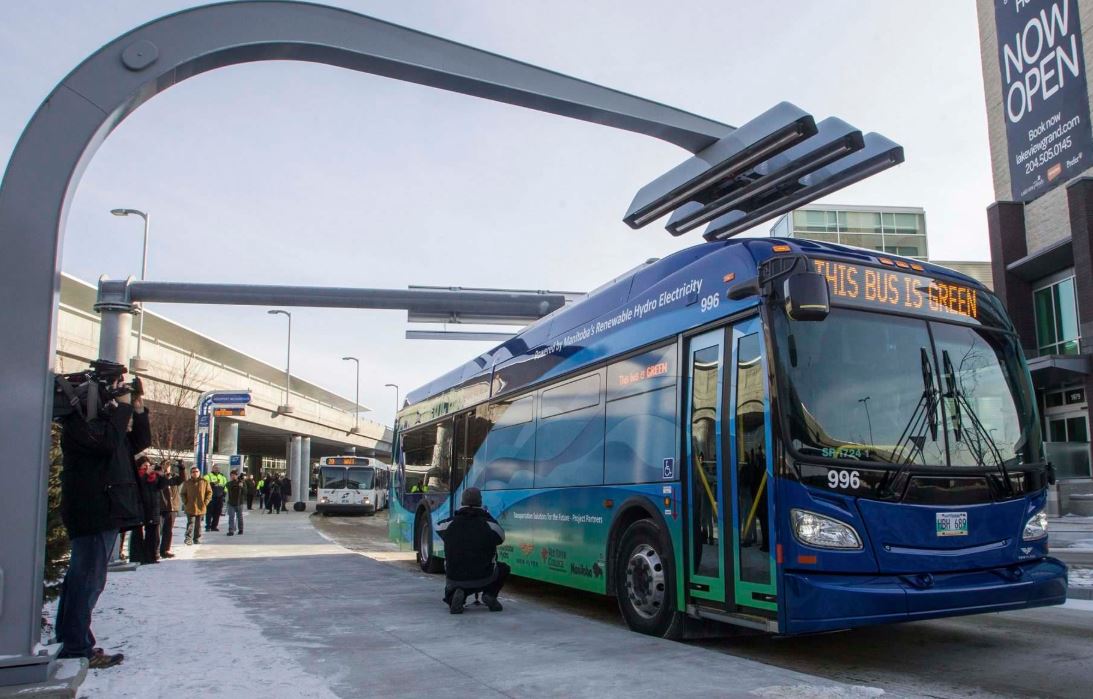By: Nazim Cicek
Posted: 11/13/2018 3:00 AM
https://www.winnipegfreepress.com/opinion/analysis/time-to-electrify-winnipeg-transit-500342242.html
Electric buses are still considered experimental in Winnipeg, while many other jurisdictions around the world move toward fully electrified transit systems.
Now that the 2018 municipal election is in the books, we should congratulate Mayor Brian Bowman and all current city councillors on their successful campaigns. Recognizing that it is a difficult task to balance all the competing needs of a city the size of Winnipeg, the notion that "with great power comes great responsibility" still holds true. With all that has been recently discussed around the electrification of public transportation, it’s easy to miss the forest for the trees. Regardless of political affiliation, there are general facts that all parties should be able to agree upon. It is better for Manitoba to use homegrown electricity than imported diesel fuel. Avoiding air pollution from diesel emissions is good for the health of citizens, and especially for transit users, drivers and service technicians.
Eliminating greenhouse gases from public transit reduces carbon costs for the city. Quieter buses are good for ridership and neighbourhoods.
There is sufficient experience locally in evaluating and manufacturing electric buses. And finally, global trends point toward increased adoption of electric transit buses in the near future.
In a recent press release, New Flyer Industries announced its latest electric bus order — it came from the San Diego Metropolitan Transit System and involved six electric buses and associated charging stations. The buses selected will be equipped with 480-kilowatt batteries, which will provide a range of well over 300 kilometres per charge. This will cover even the longest routes, requiring only nighttime, in-garage charging. They will also feature the latest onboard, video-surveillance systems, enhanced wheelchair accessibility and safety, electric air conditioning and other electric accessories.
This comes on the heels of the largest electric bus order in Canada’s history, which was announced at the end of August: 40 New Flyer electric buses that will service Montreal and Laval transit users. And earlier in the summer, the Toronto Transit Commission announced the purchase of 10 electric buses, with an option to buy 30 more within two years.
While these examples pale in comparison to the massive adoption of e-buses in China (more than 316,000 e-buses were sold since 2011, with around 90,000 in 2017 alone), they provide evidence that the Chinese economic model, political system and incentive structure are not the only way to transition to electric mobility.
Many large urban centres have recognized that moving away from pollution-spewing old technologies can happen quickly. The cities of Paris, Los Angeles, London, Barcelona, Copenhagen, Vancouver, Mexico City, Milan, Seattle, Quito, Cape Town and Auckland have all pledged to procure only zero-emission buses from 2025 onward. If Winnipeg wants to join their ranks, it is time to act and announce a firm date when diesel buses will not be purchased any longer.
Although changes will be needed in transit infrastructure (refurbishing transit garages to accommodate heavier buses, installing charging infrastructure, etc.) and service technicians will have to receive training to work on electric buses, the long-term benefits of lower maintenance and fuel costs and a healthier work environment will be well worth the effort. When a garage transitioned from diesel to electric buses in Shenzhen, China, one of the first things of note was how quiet the facility was and that no oil smudges could be seen on the hands and faces of service technicians.
Believe it or not, at the turn of the 20th century, one of the largest issues facing major cities was the prevalence of horse manure on streets. New York City alone was home to more than 100,000 horse-drawn carriages, but by 1917, the last horse-drawn carriage had come off the road, thanks to the automobile and electric streetcars. This rapid change was primarily driven by public-health concerns, and aided by technological progress and favourable overall economics. Just like being forced to live with horse manure on city streets and suffering the inevitable health consequences, breathing in diesel exhaust from public transit should be a thing of the past. Winnipeggers deserve nothing less.
Nazim Cicek is a professor and associate head of the department of biosystems engineering at the University of Manitoba.
